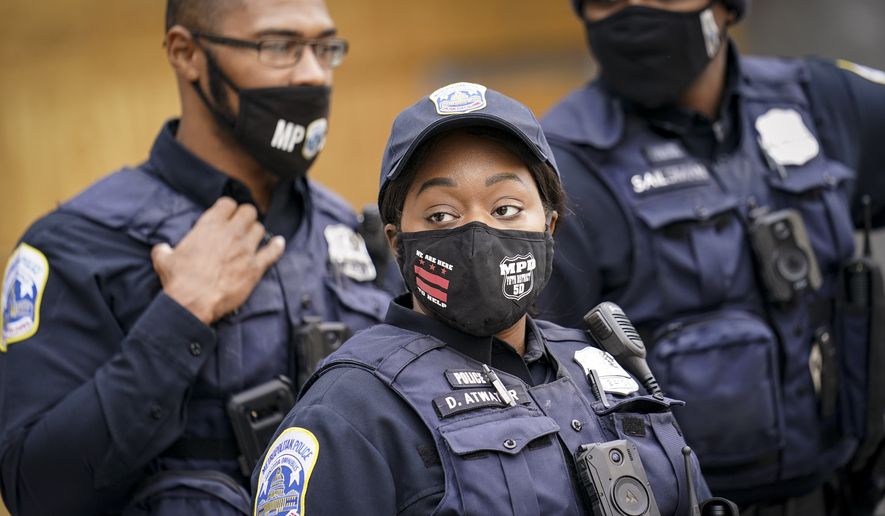A near-unanimous D.C. Council on Tuesday approved emergency legislation aimed at holding the Metropolitan Police Department accountable for overtime pay.
Meanwhile, the Montgomery County Council introduced bills that would prohibit school resource officers and require the release of certain policing data “to enhance transparency.”
The policing oversight legislation comes after a summer of nationwide protests over police brutality and racial injustice following the death of George Floyd in police custody in Minneapolis. Calls for defunding police forces echoed in many city streets across the country.
In the District, 12 lawmakers voted for the Metropolitan Police Department Overtime Spending Accountability Emergency Act of 2020. Outgoing council member Brandon Todd, Ward 4 Democrat, voted “present.”
The new emergency law, which still requires mayoral review, will be in effect for no longer than 90 days. It requires MPD to send the council an overtime pay spending report every two pay periods, including the year-to-date amount spent on overtime pay, a description of the staffing plan and what conditions justify the pay must be included.
The pay period rule was amended to the bill Tuesday, replacing a requirement that MPD alert the council when it exceeds its approved overtime budget by 5%.
“[It] will allow the council to account for trends in overtime pay spending by MPD, and raise alarm and ask questions before there is an overspending of the approved budget,” said council member Brianne Nadeau, Ward 1 Democrat.
Ms. Nadeau recently crafted the bill with fellow Democrats Robert White (at-large) and Charles Allen (Ward 6), in response to a request by Mayor Muriel Bowser to redistribute current funds to cover police expenses.
Council Chairman Phil Mendelson, at-large Democrat, supports the mayor’s request to redirect funds to cover nearly $43 million in police safety expenses, the bulk of which is for overtime incurred during summer protests.
Miss Bowser and Mr. Mendelson say that the costs should not fall on local taxpayers, but that the District should cover them until the Trump administration reimburses the city.
At a briefing earlier this month, Mr. Mendelson cited a “longstanding practice” by the federal government to “reimburse public safety expenses that relate to our being near the nation’s capital.”
Other council members responded to the request with concern that the amount of overtime is $10 million more than MPD’s entire approved overtime budget.
They also argued that the funds could be used elsewhere and that the proposal comes amid use of “concerning police tactics.”
In Montgomery County, council members Will Jawando and Hans Riemer, both at-large Democrats, introduced Bill 46-20, which would prohibit Montgomery County Public Schools (MCPS) from deploying student resource officers (SROs) and reallocate related funds.
If the legislation is passed, the council members want the 23 SROs from the Montgomery County Police Department who currently are working for the school district to instead fill open positions within the department.
“It’s important to note, again, police will still have to respond under the law in adequate time if they are needed,” Mr. Jawando said during a virtual press conference Tuesday. “There are other security staff and others in the building that are going to help with the school safety needs, so this is not a removal.”
The measure is expected to save nearly $3 million each year, which can be put toward mental health services and restorative justice training for MCPS staff, the lawmakers said.
“School is not a dangerous place,” Mr. Riemer said. “[T]here are occasionally incidents that happen as it happens in any environment, but … we don’t need to have police officers responding to those, and we can create a very safe community with alternative approaches that have other kinds of adults and professionals engaging with young people.”
Mr. Riemer and Mr. Jawando say the bill aims to address the fact that arrest rates for Black and Latinx students are “in greater proportion to their population.”
Over the last four years, data show that more than half of the students arrested — 75 out of the 1,042 — were Black, but they make up one-fifth of the entire student body.
A translator for former MCPS student Jason Malera said during Tuesday’s briefing that he was bullied by peers and regretted seeking help from the SROs because they “traumatized [him] with their words.”
“Their words were: we don’t understand you, we don’t speak the same language, they even said, maybe you do deserve what they want and have done to you,” Jason said.
Mr. Jawando also said there is no data that shows an armed police officer in a building reduces the likelihood of mass shootings in the U.S., many of which occurred in places with armed security onsite.
“Students are more likely to be safe from other investments in the school building like vestibules that we’ve been building so that people can’t enter right away, locking doors for classrooms, [and] training for staff,” he said.
The other police-related legislation is also co-authored by Mr. Jawando and three council members, and calls for Montgomery County police to submit an annual report to the council about police stops.
If Bill 45-20 is approved, the police department must provide demographic information related to all “individuals stopped (including a stop and frisk that doesn’t result in a citation or arrest), searched, cited, arrested or the subject of a use of force incident by the department.”
The new rule was suggested by the county Office of Legislative Oversight after a report this year revealed the police department does not track street stops or “consistently” record ethnicity data “which may undercount MCPD’s interactions with Latinx residents.”
Moreover, the data that was available showed “wide disparities in police-public interactions by race and ethnicity in the county, especially for traffic stops and violations, arrests, and use of force.”
• Emily Zantow can be reached at ezantow@washingtontimes.com.




Please read our comment policy before commenting.